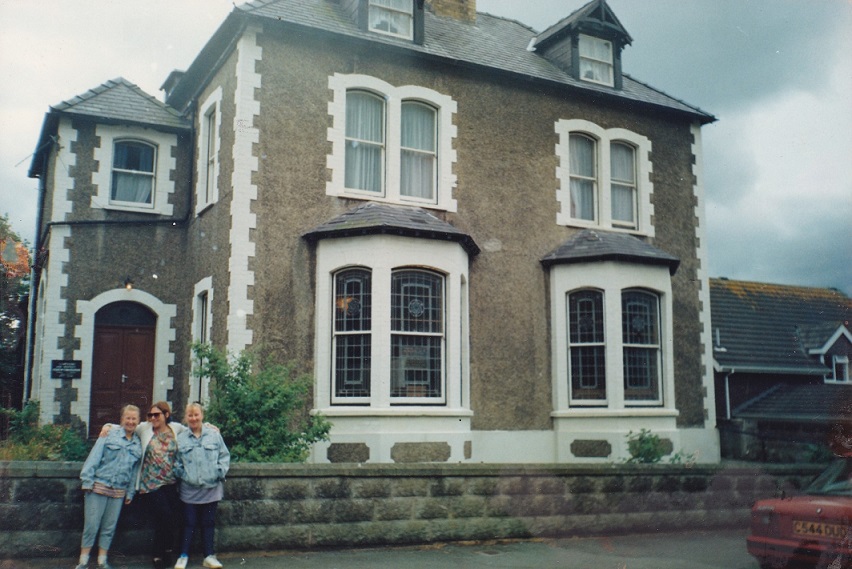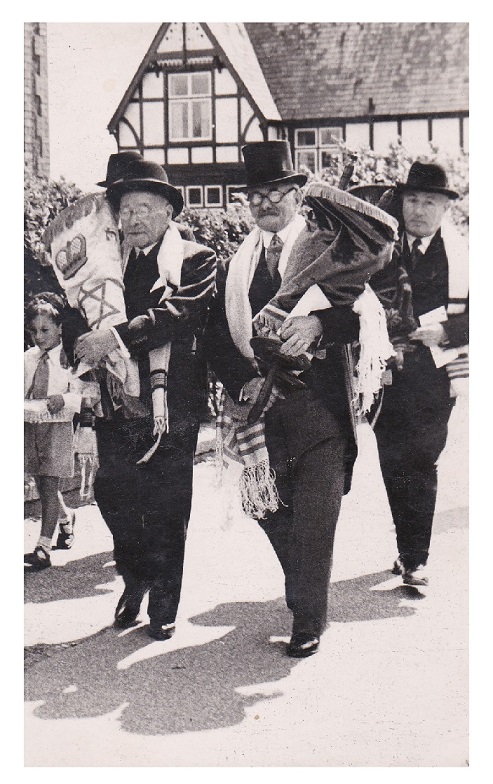|
||||
|
|
||||
|
 Llandudno Synagogue ©Bernard Croop
The Llandudno Jewish Community, by Bernard Croop I was born in Llandudno in 1943 and my brit was performed in Llandudno by Rabbi Reuben Rabinowitz of the Birmingham Central Synagogue. He had been a long standing friend of my mother's family (the Ackerman family) since the time of his recruitment to the post as Rabbi of the Central Synagogue. I was told that my brit was the last one that Rabbi Rabinowitz was to perform. My father (Israel Benjamin Croop) lived in Llandudno all his life, apart from having been born in Manchester in 1909. Presumably my grandmother had gone to stay with family in Manchester for the confinement. My grandfather, Solomon Croop (שלמה בן שרגא צבי), born in 1882 in Liastskov, a village close to Kovno (later to become known as Kaunus, the temporary capital of Lithuania in the interwar years), had arrived in Llandudno in 1902 at the age of 20. His surname on arrival in the U.K. was Krupp which he continued to use until 1922, when he changed the spelling because on anti-German sentiment at the time. He and an elder brother had been told by their parents to run quickly away from Lithuania to avoid being captured by an advancing force of the Tsarist Russian army who were in the area inducting young boys into their forces. The two brothers ran until they reached Norway where they settled down to work and earn a living. My grandfather used to tell me stories of his life in Norway, working on whaling ships in the summer and hunting bears in the north of Norway in the winter. Around the year 1900, my grandfather's elder brother had travelled to Manchester to join family whom he knew were living and established there. He worked as a glazier and adopted the family name Glass. My grandfather followed his brother in 1902, ostensibly for a visit to see him and without any intention of staying in the U.K. However, on reaching Manchester, he met up with the family there who told him that his brother was working on a big project in Llandudno in North Wales, putting the windows into a large convalescent home that was being built there at the time. My grandfather took the train from Manchester to Llandudno, some 85 miles away, looked around and everything he saw reminded him of Norway - the sea, mountains, lakes, rivers, forests etc. (Missing were the whales and bears!) So he decided not to return to Norway but, rather, to settle in Llandudno. And that's how he came to be amongst the first Jews to settle there. Soon after his arrival, he met another Jewish immigrant to the area, a Mr Morris Wartski, whose origins were in Russia. Together they founded the infant Llandudno Hebrew Congregation (in the early 1900s according to notes in the JCR-UK Web site), although Morris Wartski was twice my father's age at the time. From my earliest personal recollection of the Congregation, services were held until 1948 in the Masonic Hall in Upper Mostyn Street, an extension of the main thoroughfare of the town. I have vivid memories of the ladies gallery, and having to run the gauntlet of the row of senior lady members of the assembled community, all with their big, bright, red, rosebud lipsticked mouths and all trying to hug me and kiss me, in my quest to move from my mother's seat to sit with my father. I was not even five years' old! I was scarred for life and, as I grew up, avoided friendships with girls who wore red lipstick! In 1948, services were transferred to a newly purchased and converted large private house at 28 Church Walks, a lovely residential street in the shadow of the Great Orme. Psalm #121 became the favourite of the congregation, particularly when we were one short of a minyan! I discovered, about four years ago (2012) during a visit to Llandudno, that prior to moving to Church Walks, plans were being drawn up to move to premises in the centre of the town, next to the General Post Office in Vaughan Street. A newly established art gallery, having been converted from a large piano emporium (Wagstaffs), had exhibits relating to the history of the site amongst which I found one relating to the aborted plans to develop the site as a new home for the Hebrew Congregation. On reflection, I thing the elders of the Congregation made a wise decision in choosing to move to Church Walks.
From the age of five until I left the town for University in London in 1961 at age 18, I doubt if I missed any service in the new "Shule" except for sickness or absence. It was like a second home. My father was the Secretary of the Congregation and my grandfather an Honorary Vice President for as long as I can remember. The size of the Congregation was at its greatest probably immediately after WWII, some 45 - 50 families, several of whom arrived as refugees from the large urban centres in north and central England which were heavily bombed during the War. Numbers declined gradually but progressively after the War until the present day when there are just two or three members remaining from the time I was resident there. Although other North Wales communities no longer exist, survivors from those other centres still retain a connection with the Llandudno Congregation and augment the attendances on Hagim etc. But the thing which rescued the situation and offers a promise of a long term continuation of the Congregation is the fact that the Chabad community from Manchester effectively "took over" the management and financing of the Llandudno Shule and invested a large amount of money into the building to make it suitable for use as a retreat for Rabbonim and youngsters to have study weekends there. Separate dormitories for girls, boys and Rabbonim were built; new catering facilities for communal meals; central heating; etc. Despite all this, the interior of the Olam Ha'tfilot remains very much as I remember it in 1961. The memorial wall Plaques record the names of deceased members, from my own family and of friends from bygone days. It's like a time warp for me when I step inside the Olam. I record below names I recall of members over the years, in no particular order:
Solomon Croop, my grandfather
For most of my childhood years there was a resident full time minister at the Shule. His role was multifunctional: conducting all services, ba'al koreh, ba'al t'kiah, shochet, cheder teacher and conducting the occasional wedding. My father was the appointed Secretary for Marriages. I remember Rev Bernard Landau, Rev Max Model, Rev Chiswell. Fresh Kosher beef, lamb and chickens were always available with sales hosted by a local butcher who maintained a kosher section. The town boasted several kosher boarding houses (B&B's) and at least one medium sized kosher hotel, the Sefton Gate Hotel, owned and managed by a Liverpool family, Jack and Bessie Morris.There was no Jewish cemetery until the very recently establishment of the local Jewish Liberal Jewish Cemetery. In my years living there, most members maintained membership of burial societies in major cities such as Liverpool, Manchester or Birmingham.
Further Reminiscence by Bernard Croop Two of the businesses pictured I remember very well - Wartski’s and Gubbay family’s Oriental Stores. One of the two shops was purely for silver products and the other was general jewelry and silver and antiques. When I was about 12 or 13, they closed one of the two shops and consolidated into just the other. A local businessman in the restaurant business, a certain non-Jewish man called Bert Dowell, converted the premises into Llandudno’s first Coffee Bar, the “Venezia”. Bert was well known to my father. In the course of the renovations, Bert found something which he showed to my father - it was a very large Mezzuzah, in a beautifully carved case. Dad explained to Bert what it was why Jews attached them to their doorposts. Oh, said Bert, like a good luck charm. I’ll keep it and fix it over the door of my new business! I’ll see if it can do for me what it did for the Wartski’s! So that’s what he did and the business was extremely popular and profitable. Bert did not forget and for years after thanked my father profusely for his contribution to his new enterprise. The other shop, the Oriental Stores, was a 24/7/364 business. Closed only on Yom Kippur. The family had come from Iraq and I only ever knew the mother, her three sons and their wives, all of whom had been brought over from Iraq by the mother, one by one, to be married to the sons. A very traditional Iraqi family, in many ways. I used to spend ages looking at the cameras, binoculars, watches etc in the glass display cases on the pavement outside the entrance of the shop. They were also famous for selling a wide selection of seaside picture postcards, many of them quite saucy and the police regularly issued fines for displaying those which crossed the line of decency. Another branch of the family was in Prestatyn, near Rhyl. They opened one of the first deep-cut discount grocery supermarkets called KwikSave. Just piles of cartons with the fronts cut out, nothing fancy at all. It was a big success. Now defunct. Photographs of the Concecration of the Synagogue in 1948 Llandudno Jewish Community & Congregation home page on JCR-UK Jewish Communities & Congregations in Wales home page
Explanation of Terms | About JCR-UK | JCR-UK home page Contact JCR-UK Webmaster:
This website is
owned by JewishGen and the Jewish Genealogical Society of Great Britain. All
material found herein is owned by or licensed to us. You may view, download, and
print material from this site only for your own personal use. You may not post
material from this site on another website without our consent. You may not
transmit or distribute material from this website to others. You may not use
this website or information found at this site for any commercial purpose. Copyright © 2002 - 2025 JCR-UK. All Rights Reserved |
||||
|
|



